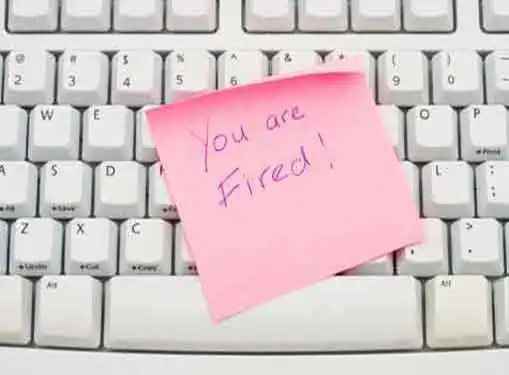Small Business Human Resources Advice
When to Fire an Employee
Written by Cory Thompson for Gaebler Ventures
Giving assistance to problem employees can be beneficial to any business. But at what point is it time to say enough is enough?
As a business owner or general manager, one of the most important roles you will play is in the management and training of employees.

As any manager knows, employees come with all manner of skills, abilities, and work ethics.
For those who are fortunate, the screening process for new hires will be sufficient to ensure that only best fit candidates are selected into your organization. However, considering most small businesses lack sufficient capital to adequately investigate all potential new hires, occasionally an individual who really doesn't belong will make it into the company.
The key question that a business owner or manager should ask themselves at this point it: should we continue investing time and money into this employee, or would we be better served by replacing them as soon as possible?
While the following list is not all inclusive, there are a few things to consider in making a decision to terminate an employee.
How easy is it to replace their skill set?
It is perhaps easy to get into a position where decisions regarding your employees are made on an emotional basis. When someone does something that evokes an emotional response, take some time to think before making a rash decision. One of the issues I had to deal with as a manager was taking into consideration if the individual in question had sufficient skill to warrant some tolerance of bad behavior.
Let me explain -- problem employees take time and resources away from other aspects of your business. However, if the persons net output exceeds the net cost of behavior management issues, it may be worth the effort to try and work things out.
If it doesn't, then the decision to replace them is simple.
Do we have coverage during the interim period?
Bad employees are a drag on the organization, but no employees may be an even greater drag. Considering work still needs to be accomplished with or without the offending individual, it is critical as a manager or business owner that you prepare for workload reassignment BEFORE terminating your bad apple.
Without doing so, you not only risk damaging the terminated positions workload but offending your other high burners as well.
Can they be reassigned to a more suitable job?
The hiring and screening process costs a lot. It costs in time, money, and tasks individuals that could otherwise be producing for your organization. In many instances, a bad employee may be nothing more than improperly assignments. If this is the case, then the onus is on you as a manager for making a poor work assignment decision, not the employee.
Before deciding to terminate someone, be sure that the skill set they do have wouldn't be better suited to a different position. By doing so, you retain valuable corporate knowledge and avoid the tedious process of rehiring.
Are there legal consequences?
I will end here with a cautionary note: if there is one thing I have learned over the years, documentation is critical when it comes to employee matters. While large corporations have extensive staff to ensure compliance, as a small business owner you will have to deal with these things yourself.
Whatever you do, document, document, document! Everything. All the time. There is nothing that will give you greater protection if a dispute arises regarding employment issues.
Cory Thompson enjoys writing about topics of interest to entrepreneurs and small business owners. He is an MBA graduate from Weber State University and is currently working as a contracting officer at Hill Air Force Base in Roy, Utah.
Share this article
Additional Resources for Entrepreneurs



Conversation Board
How do you determine when to fire an employee? Please share your experiences on firing employees or ask questions about terminating an employee. We welcome all comments!